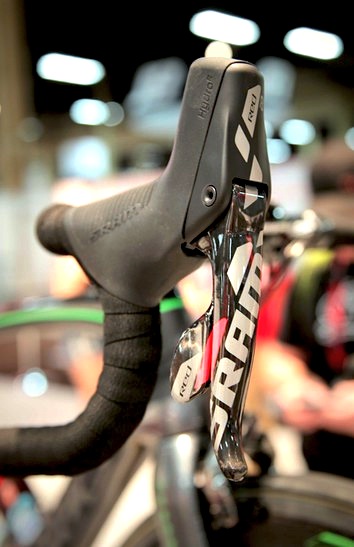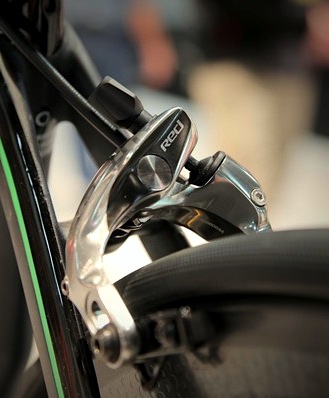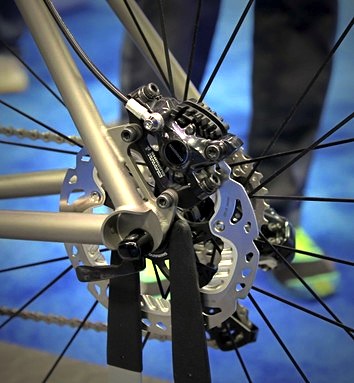
SRAM Red hydraulic brake lever
2013 has seen the release of hydraulic braking systems for the road and cyclocross market from both SRAM and Shimano, but one may wonder why? Mechanical rim brakes options from both manufacturers operate perfectly with great power and feel, so why do they think we need hydraulic?
What are hydraulic brakes? Any mountain biker worth their salt could answer this without pause. Basically, instead of the cable pulling action of a mechanical system to actuate the brake caliper, hydraulic systems use the pushing pressure of oil. This therefore requires a reservoir at the lever and a piston at the caliper to do the work. Hydraulic brakes have been used on mountain bikes for many years, and are the same system found in your car.
If you're interested in checking it out for yourself, the best place to start is your local bike shop. The proof is always in the riding, and knowledgeable staff can outline whether this technology is appropriate for your situation.
What are the benefits of hydraulic brakes?
1. Power, and lots of it
More power = good...or does it? A more powerful brake has a greater likelihood of locking-up, resulting in loss of control. Riding skinny road tires requires caressing your brakes at times to avoid catastrophe. Riding down a grassy, muddy slope into a corner on a cyclocross bike is different, and in this situation power does equal good!
2. One finger control
Mountain bikers know the wonder of one-finger braking. Using hydraulic fluid as the caliper actuator means that maximum brake force can be achieved with minor pressure from one finger. This allows you to keep both hands firmly gripping the bars which increases confidence and also reduces fatigue.

SRAM Red hydraulic brake caliper
3. Modulation
Recently at Interbike, both SRAM and Shimano representatives told me that the greatest thing about hydraulic brakes was modulation. In fact, as mentioned already, too much power is bad on the road as it quickly results in brake lock-up. The way to good braking is gently applying force to slow your bike without locking the wheels: this is called the "feel" or modulation.
4. All weather
Disc brakes utilizing hub mounted rotors are the best option for all weather and environmental conditions. Think of a European cyclocross race through mud and snow: These are the perfect conditions for hydraulic disc brakes.
5. Ease of use
Hydraulic systems are reliable and easy to use. There are no issues regarding cables breaking or rubbing in the outer casing and little maintenance required.
But...What are the downsides of hydraulic brakes?
1. Weight
Hydraulic brakes weigh more than a basic mechanical caliper setup. This is because of the added bulk of the reservoir, piston caliper, disc rotor (if necessary) and beefing up parts of the frame and/or fork to cope with attaching the caliper itself. Shimano says their system could weigh up to 300gm more than a standard setup which is a fair whack when talking road bikes.
2. Is more power better?
As already stated, "No, not necessarily". Powerful brakes will lock-up more quickly and when riding on skinny slick tires it is not optimal! A period of accostomization will be required to get used to easing on the brake lever.
3. Maintenance
While a positive for hydraulic systems is their ease of use and minimal required maintenance, when things do go wrong they can be problematic. Cables are easy to replace and are serviceable by any cyclist with even minimal mechanical knowledge. Hydraulic systems are serviceable by a home mechanic, but require a greater depth of knowledge, experience and specific tools.
DID YOU KNOW? Hydraulic brakes have yet to be approved by the UCI (cycling's governing body) for use on bikes other than mountain bikes, so it will be a while before we see them used professionally.
Conclusion

Shimano hydraulic brake caliper
Greater modulation is great, as is all weather function and the massive braking power available from hydraulic systems, but for road bikes? I can see this technology taking off in the cyclocross scene where these features would be a great benefit to that style of riding (which is akin to mountain biking in more ways than one).
In the professional scene the weight isn't really a problem as bikes are so light now that many riders have to add weight to meet the UCI restrictions. Shaving off a couple of hundred grams to compensate for heavier brakes is not very difficult, but this is all academic until the technolgy gains UCI approval.
For the average rider? Mechanical caliper brakes, like Shimano's line-up, are brilliant and perform flawlessly with plenty of modulation and power. Time will tell if the new technology takes off in the marketplace, but it is fairly typical in the bicycle industry that it you build it, they will come.


